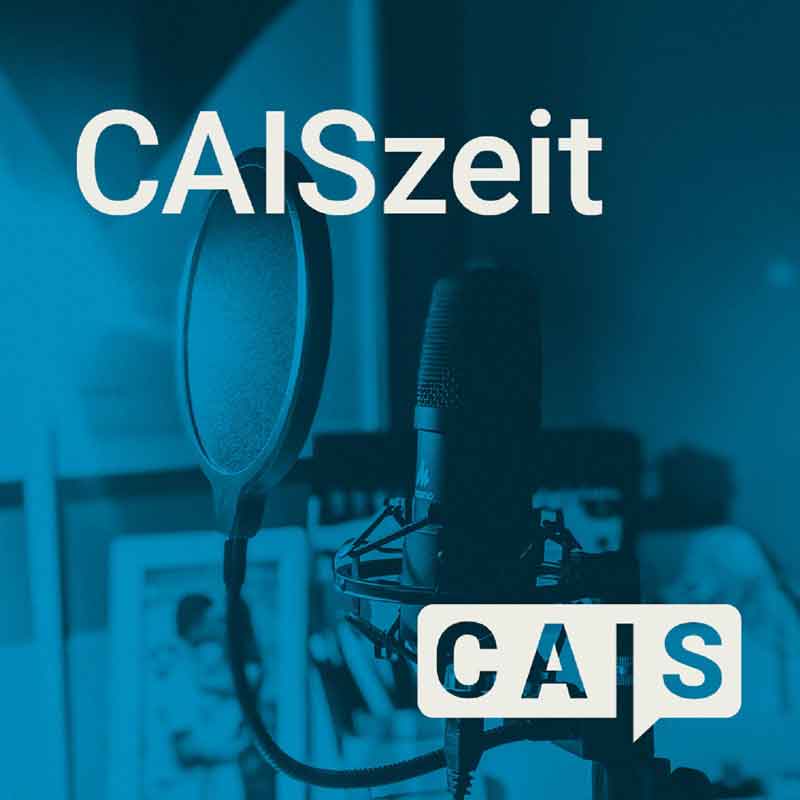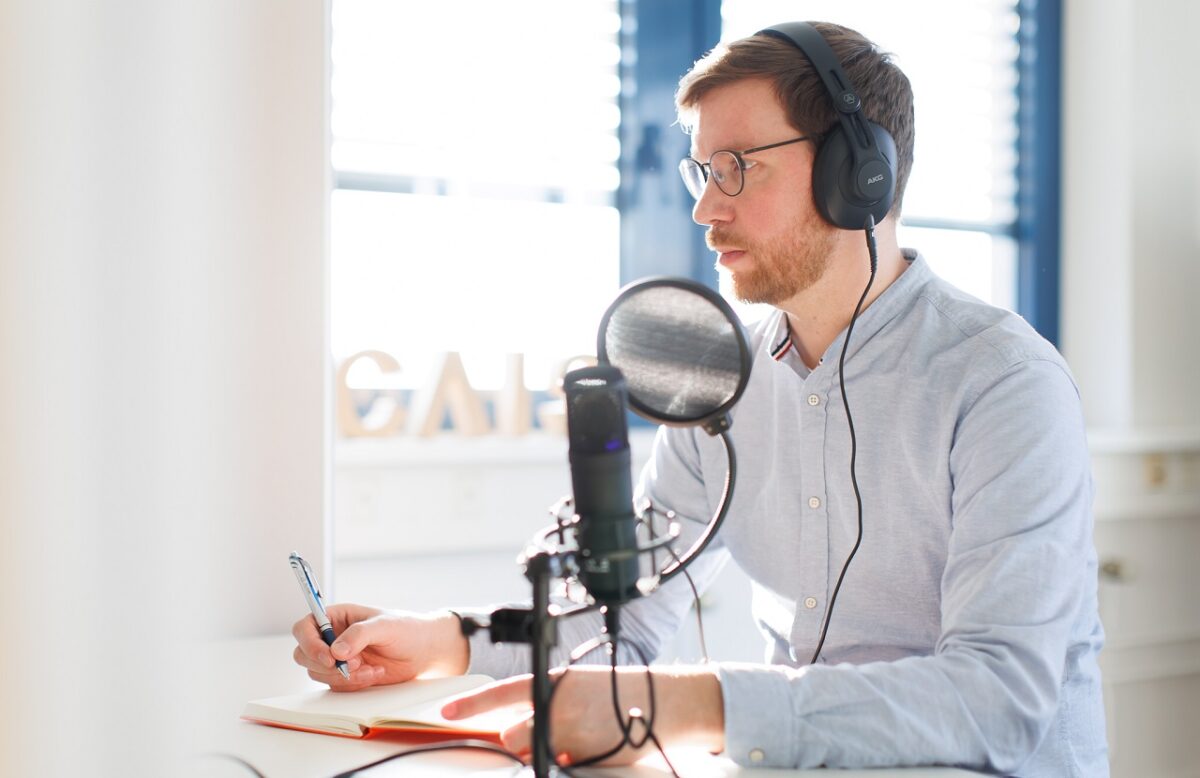CAISzeit – The Podcast

What kind of digital society do we actually want to live in? CAISzeit is dedicated to this very question. In the podcast of the Center for Advanced Internet Studies (CAIS), we discuss with researchers from various disciplines how the digital transformation is changing our society.

What dangers are there in the digital space and what potential does it open up? Which digital innovations will determine the future? How are digital technologies already changing the way we work, inform ourselves and form our opinions? Against the backdrop of scientific research, we look with our guests at multifaceted phenomena of digitalization. Digital transformation is more than a purely technological phenomenon. As a socio-technical process, it is already shaping politics, the economy, the media, culture and our entire social life.
In CAISzeit, we talk to researchers about the phenomena of digitization. In addition to addressing the risks, we focus on looking constructively into the future and finding possible solutions.
Dr. Matthias Begenat, Head of Science Communication
Credits
Intro/Outro Music: ccbysa4.0 tastenspieler
intro/outro narrator: Laura Habke
Editing: Heiner Kunkel
Current episode
What is AI doing in the classroom? From research on educational technologies – Guest: Prof. Dr Nikol Rummel and Dr Sebastian Strauß
ChatGPT is on everyone’s lips. Even at schools and universities, there is hardly a topic that is being discussed more controversially. Generative artificial intelligence is sometimes viewed very pessimistically or – on the other hand – praised as a technology that will bring salvation. Often both are done without reference to research results, undifferentiated and very one-sided.
ChatGPT is on everyone’s lips. Even at schools and universities, there is hardly a topic that is being discussed more controversially. Generative artificial intelligence is sometimes viewed very pessimistically or – on the other hand – praised as a technology that will bring salvation. Often both are done without reference to research results, undifferentiated and very one-sided.
The discussion ends in the question of whether teachers will still be needed in the future. But is this really a relevant question?
We want to broaden our perspective and venture deeper into the topic (it is about much more than ChatGPT): What does the use of AI in education actually mean for students and teachers? How can AI be used meaningfully in and alongside teaching? What does research say: Do children and adults learn differently when technology is involved?
In CAISzeit, Dr Matthias Begenat talks to two proven experts about this: Prof. Dr. Nikol Rummel heads the research programme Educational Technologies and Artificial Intelligence at CAIS and is Professor of Educational Psychology and Educational Technology at the Ruhr University Bochum. Dr Sebastian Strauß is a post-doctoral researcher at the Ruhr-Universität in Nikol Rummel’s team and an associate researcher in the CAIS programme. His research focus is computer-supported collaborative learning.
Research content recommended in the interview:
- Statement of the German Ethics Council on Humans and Machines – Challenges posed by Artificial Intelligence. There is a section on education here that I highly recommend – there is also a short summary. https://www.ethikrat.org/fileadmin/Publikationen/Stellungnahmen/deutsch/stellungnahme-mensch-und-maschine.pdf
- Wayne Holmes, Stamatina Anastopoulou, Heike Schaumburg, Manolis Mavrikis – Personalised Learning with Digital Media. A common thread. https://www.bosch-stiftung.de/sites/default/files/publications/pdf/2018-06/Studie_Personalisiertes_Lernen.pdf
- DFG research group “Promotion of Diagnostic Competencies in Simulation-based Learning Environments in Higher Education (COSIMA)” led by Prof. Frank Fischer from LMU Munich. On the web: https://www.for2385.uni-muenchen.de/index.html. On Twitter: https://twitter.com/COSIMA_MUNICH
- Ken Holstein (researches Teacher Awareness Tools, co-design with teachers, complementarity of humans and AI in the classroom). On the web: https://www.thecoalalab.com/kenholstein. Twitter: https: //twitter.com/d19fe8
- Simon Buckingham-Shum: University of Technology Australia (researches the use of digital learner data in different contexts). On the web: https://profiles.uts.edu.au/Simon.BuckinghamShum (here you can also find videos by and with him)
- KI Campus: here you can find free online courses on various topics related to artificial intelligence. https://ki-campus. org/
- Virtual Competence Centre “Teaching and Learning Writing with AI – Tools and Techniques for Education and Science”: this is about writing in educational institutions and science. The website includes publications, a blog and resources on Large Language Models in education. https://www. vkkiwa.de/
- Meredith Broussard – Artificial Unintelligence (a non-fiction book by a data journalist, it talks about digitisation and machine learning and how it works, but also addresses issues from the US context about textbooks and standardised testing). https://mitpress.mit.edu/9780262537018/artificial-unintelligence/
- Pedro De Bruyckeres, Paul Kirschner, Casper Hulshof – Urban Myths about Learning and Education. https://www.sciencedirect.com/book/9780128015377/urban-myths-about-learning-and-education#book-description
Can you recommend any novels, films or documentaries on the subject?
- Kazuo Ishiguro: Klara und die Sonne (not really about education, but it happens)
- Marc-Uwe Kling: Qualityland (this is about personalisation of all life situations. Well transferable to education)
All episodes
What is AI doing in the classroom? From research on educational technologies – Guest: Prof. Dr Nikol Rummel and Dr Sebastian Strauß
ChatGPT is on everyone’s lips. Even at schools and universities, there is hardly a topic that is being discussed more controversially. Generative artificial intelligence is sometimes viewed very pessimistically or – on the other hand – praised as a technology...
Data for the smart city and you’re up and running: Is it really that simple? – Guests: Dr. Thomas Bartoschek, Marlene Damerau, Prof. Dr. Christoph Bieber
The idea sounds tempting: data is collected, evaluated and used for urban development. Whether it’s traffic routing, noise pollution or improving the climate – by collecting and evaluating data, many things seem controllable and better designed.
Digital Social Election 2023: More than a test run? – Guest: Prof. Dr Christoph Bieber
in 2023, eligible voters in Germany will be able to cast their votes online for the first time in a so-called remote election. This is made possible by a test run, which will be carried out during this year’s social...
Do Algorithms Make Opinion? – Guest: Prof. Dr Cornelius Puschmann
What empirical evidence does research find for the filter bubble hypothesis? How personalised are algorithms? How do you actually research them? How should they be regulated? And: Do we need a special algorithm competence for users?
Digital Allmende? Cultural Assets on the Net – Guest: Dr. Jörg Lehmann
Should historical sources, images and texts be made freely accessible? And how could this be realised? Under what conditions can one speak of a digital cultural commons?
Digital commons? Cultural Assets on the Net – Guest: Dr. Jörg Lehmann
Should historical sources, images and texts be made freely accessible? And how could this be realised? Under what conditions can one speak of a digital cultural commons?
Social Media and Mental Health – Guest: PD Dr. Julia Brailovskaia
Looking at our mobile phones, opening apps and receiving notifications about likes have long been a constant companion in everyday life. But what effects does this actually have on our psyche?
Searching and finding research topics: The CAIS Research Incubator – Guest: Dr Josephine B. Schmitt and Samuel Simon
How do researchers arrive at their research topics? Who or what determines what researchers work on? These are the topics of today’s CAISzeit episode.
Digitisation in the Super Election Year 2021 – Guest: Prof. Dr. Gerhard Vowe
How and at what points can a digitalisation of the election campaign actually be observed in the super election year 2021? CAISzeit looks back at the 2021 federal election campaign.